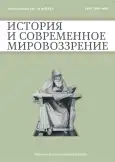Centralization of Military Awards the Red Army after the End of the Civil War (1922-1933)
- Authors: Zapary V.V.1, Shunyakov D.V.1
-
Affiliations:
- Ural Federal University named after the First President of Russia B. N. Yeltsin
- Issue: Vol 4, No 1 (2022)
- Pages: 15-23
- Section: Articles
- URL: https://journal-vniispk.ru/2658-4654/article/view/147205
- ID: 147205
Cite item
Abstract
Keywords
Full Text
##article.viewOnOriginalSite##About the authors
Vladimir V. Zapary
Ural Federal University named after the First President of Russia B. N. Yeltsin
Email: vvzap@mail.ru
Dr. Sci. (Hist.), Professor, Honored Worker of the Higher School of the Russian Federation Yekaterinburg, Russian Federation
Dmitry V. Shunyakov
Ural Federal University named after the First President of Russia B. N. Yeltsin
Email: d.v.shuniakov@urfu.ru
Department of undergraduates of the Domestic Institute of the Ural Humanitarian Institute Yekaterinburg, Russian Federation
References
- Revolutionary Military Council of the Republic. Protocols. 1918-1919. Moscow: Russian world. 640 p.
- Collection of laws and orders of the Workers' and Peasants' Government of the USSR for 1930. Moscow: Soviet legislation. 575 p.
- Collection of laws and orders of the Workers' and Peasants' Government of the USSR for 1933. Moscow: Administration of the Council of Ministers of the USSR. 937 p.
- Collection of persons awarded the Order of the Red Banner and honorary revolutionary weapons. Moscow: State Military Building. 303 p.
- Ivanov, S. A. (2009). Development of the system of awards with orders and medals of military employees of the Red Army (1918-1945): dis.... сandidate of Sciences. Moscow: 254 p.
- Decrees of Soviet power: in 18 tons. Moscow: Politizdat.
- Soviet constitutions. Chrestomatia: at 4 h. / Comp. D.V. Kuznetsov. Blagoveshchensk: Publishing House of the Annunciation state рedagogical university. 2015.
- Data on the number of awards with orders and medals of the USSR for the period 1918-1964. Vestnik arhiva Prezidenta RF, 3, 132-157.
- Zapariy V.V., Shunyakov D.V. (2018). Awards and award system: definitions and characteristics. Ural industrial'nyj: Bakuninskie chteniya. Ekaterinburg, T.1, 333-345.
- Durov V.A., Strekalov N. N. (2005). Order of the Red Banner. Moscow: Collector's Book. 224 p.
- History of the military strategy of Russia / ed. V.A. Zolotarev. Moscow: Kuchkovo field; Polygraphic resources. 592 p.
- Kolesnikov G. A., Rozhkov A. M. (1983). Order and medals of the USSR. Moscow: Military building. 302 p.
- Kutsenko A. N., Smirnov Yu. D. (1996). Order of the Soviet Republics. Donetsk: Ed. enterprise «Swan». 400 p.
- Malinkin A. N. (2013). Award as a social phenomenon. Moscow: Center for Humanitarian Initiatives. 324 p.
- The first worm (1917-1929) /edited by I. Dubinsky and N. Savko. 1931. Moscow: State Military Building. 191 p.
Supplementary files








